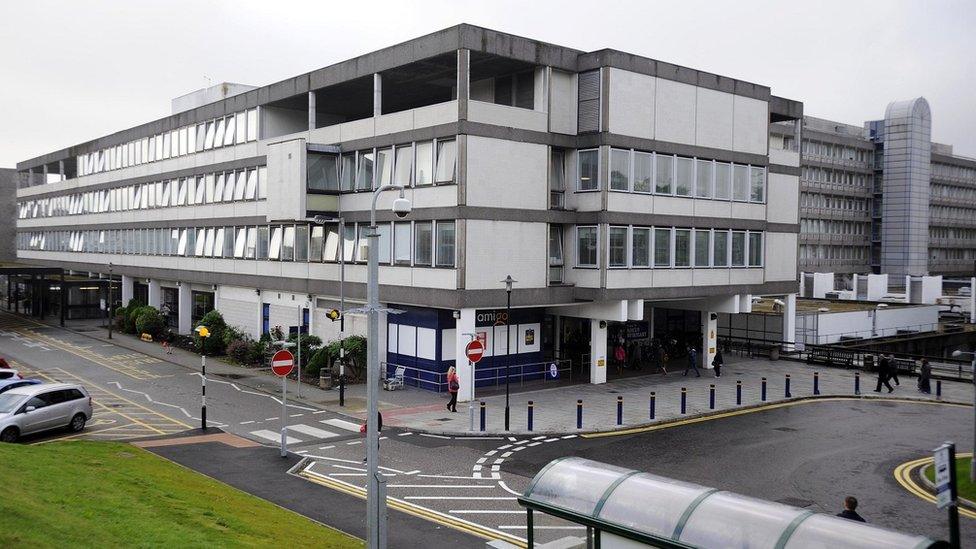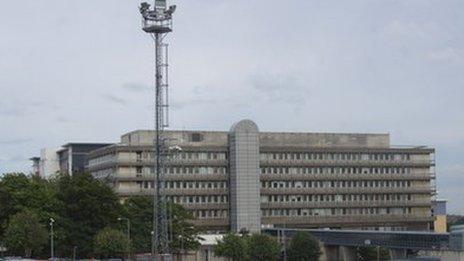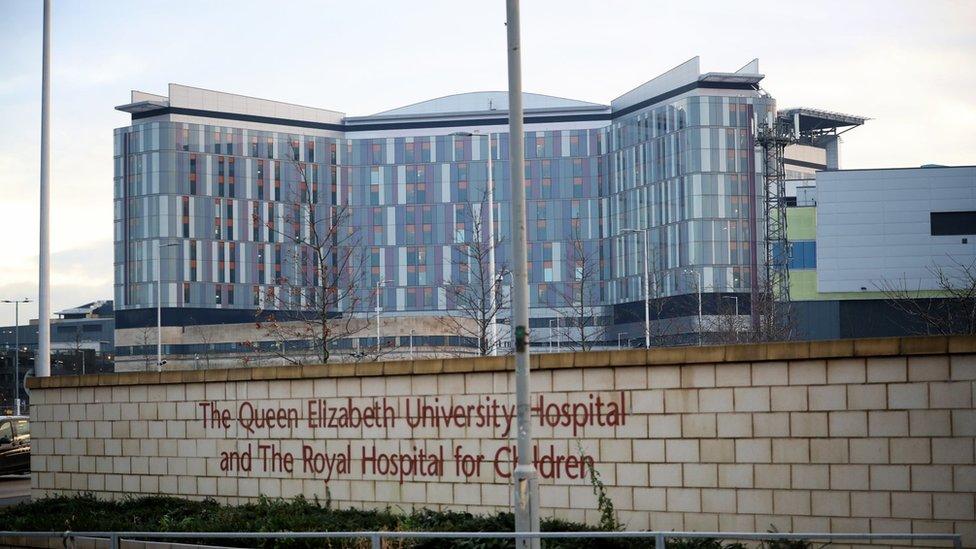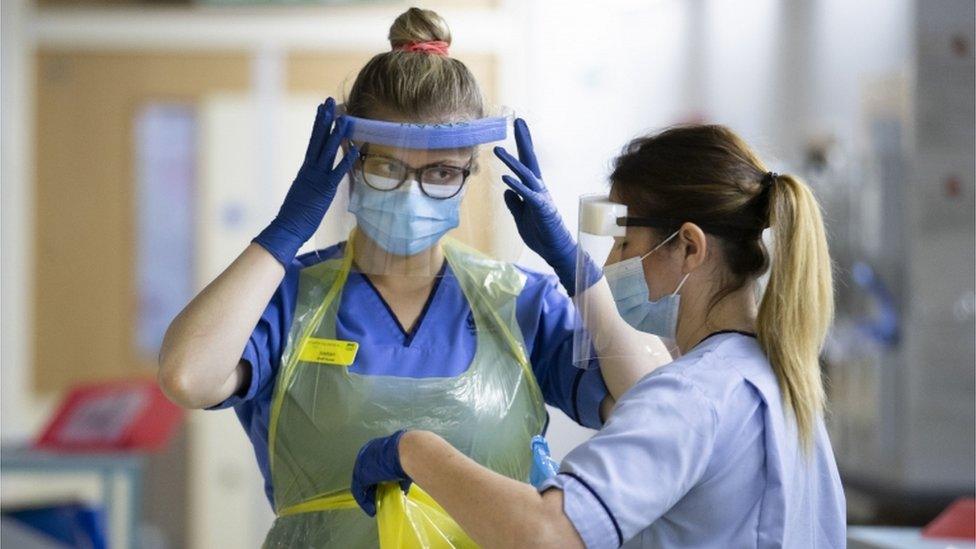NHS whistleblowers warn of 'unsafe' A&E staff shortages
- Published

Aberdeen Royal Infirmary's emergency department has faced sustained problems with finding inpatient beds for people who no longer need to be in A&E
A group of senior doctors has accused NHS Grampian of ignoring their safety concerns about emergency departments.
They told BBC Scotland News they were speaking out because they feel they cannot deliver a safe level of care.
The medics said staff shortages meant Grampian's two A&Es have no senior registrars on shift to make key decisions about patients for the majority of weekend night shifts.
NHS Grampian said it was working hard to expand the workforce.
A spokesperson thanked staff and said it recognised the "tremendous pressure" on A&E departments but said there were was a national shortage of doctors at the appropriate level of training.
A number of senior doctors spoke anonymously to BBC News about conditions in Elgin and Aberdeen emergency departments.
Documents seen by the BBC News show medics have been raising concerns since 2021, both with NHS Grampian and the Scottish government, and in July this year submitted a formal whistleblowing complaint about the situation.
One doctor said: "The staff are in an impossible situation.
"We are witnessing ongoing harm with unacceptable delays to the assessment and treatment of patients.
"There have been avoidable deaths and at other times there are too long delays getting to patients who may be suffering from a serious condition like stroke or sepsis."
In March last year, one senior clinician wrote to NHS Grampian bosses to warn of the "incredibly stressful and difficult" conditions in Aberdeen Royal Infirmary's emergency department.
The letter warns of the dangers of ambulances "stacking" outside the hospital and a high number of patients with chest pains or headaches waiting for long periods of time to be seen.
'Significant reason'
The document also has the medic declaring they have "no wish to go through what happened in 2014 again" - a reference to a staffing crisis that year in NHS Grampian.
The doctor points out they had just worked six weekends in a row to try and fill in schedule gaps before pointing out the current situation carries "significant clinical risk" and that "something significant has to change soon".
Then in January this year, a joint letter signed by a number of staff in NHS Grampian emergency departments warned these A&Es were failing and "unlikely to be able to perform their statutory duty in a major incident".

Dr Gray's Hospital in Elgin is one of two adult A&E departments in the NHS Grampian area
The letter said "exit block" - finding hospital beds for patients who no longer need to be in A&E - was the biggest patient safety concern.
It also included an estimate that between 30 December last year and 3 January this year, a total of 260 A&E patients were delayed in excess of eight hours in Grampian's emergency departments.
Using Royal College of Emergency Medicine estimates on the impact of delays on patients' life chances, they estimate these long waits equate to at least three excess deaths in that five-day period.
Five weeks after the joint letter was submitted a major incident was declared at Aberdeen Royal Infirmary on 22 February as a result of the pressures being felt by the service.
Recruitment struggles
NHS figures for the month of June show that 49% of patients who attended A&E at Aberdeen Royal Infirmary were seen, admitted or discharged within the target of four hours.
At Dr Gray's hospital in Elgin, 77% were seen within four hours at its emergency department.
Dr Lailah Peel, a junior doctor and deputy chair of BMA Scotland, said many other emergency medics will have "similar experiences" to those in NHS Grampian.
She told BBC Radio's Good Morning Scotland programme: "In A&E it is really important you have senior decision makers around, as a junior doctor I regularly go to them to get advice and sign offs.
"It is a really important part of how an A&E runs and it is really important there is a sufficient number of them - if that burden of decision making falls on one individual it is really dangerous."
Rosemary Agnew, the Independent National Whistleblowing Officer for the NHS in Scotland, told BBC News that health boards should not "wait for whistleblowing" to address issues raised by clinicians.
She added it was: "important that people do raise it because what that raises is the national awareness of a wider issue, and if I see trends of a wider issue I will raise them with the Scottish government".
'Great pressure'
A spokesman for NHS Grampian said: "We want to acknowledge the very great pressure all teams have worked under, and are continuing to work under.
"Providing health and social care services is more complex and challenging now than it has ever been.
"Some of these challenges will be specific to certain services or areas of Grampian, others are being experienced right across the NHS.
"At all levels, we are committed to meeting these challenges and resolving them. This is neither an easy nor a quick task, but it is one we will strive to complete."
The Scottish government said it has been "engaging with staff at NHS Grampian on these issues and will support with the board to ensure the steps they are taking to enhance staffing levels deliver the improvements required".


What do you do when you feel that you have nowhere else to go?
In this case, a group of doctors say all of their efforts to raise concerns with senior management fell on deaf ears.
Having exhausted all other options, they have now turned whistleblowers in the hope that it will force the health board to address the serious patient safety issues they say they are facing.
NHS Scotland's whistleblowing procedures were strengthened following an independent review into claims of a bullying culture at NHS Highland. But a recent survey by the BMA suggested nearly a quarter of doctors would still not feel comfortable raising a concern about patient safety or malpractice.
The official definition of whistleblowing relates to someone speaking up "in the public interest" about issues that could create "a risk of harm or wrong doing".
The medics in Grampian say staffing levels are so dangerous in A&E that they pose a clear and significant risk to the people the NHS should be caring for.
The whole system is under so much pressure, and the whole country faces such difficulties finding enough skilled staff, that doctors can only hope this is a positive route to improvement.
Related topics
- Published6 June 2014

- Published30 December 2022

- Published9 January 2023
